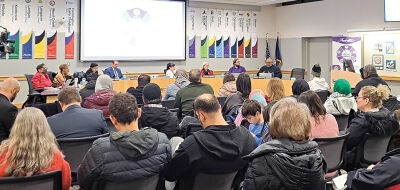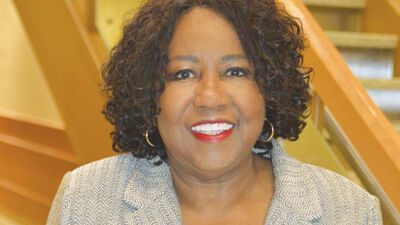
Parents, students and community members pack the Maxfield Training Center for a Farmington Public Schools special meeting on racism Feb. 14.
Photo by Charity Meier
FARMINGTON — The Farmington Public Schools Board of Education held a nearly six-hour special meeting Feb. 14 to address issues of discrimination within the district.
Concerned parents, students and community members continuously flooded in and out of the Maxfield Education Center to hear what the board had to say about issues that African American and Palestinian students in particular are facing, as well as to address their own comments to the board. At one point there were over 100 people in the room, with audience members lined up against the walls.
To view the entire meeting and the board members’ full comments, visit FPS TV10 on YouTube.
The meeting followed a January incident at East Middle School where a teacher reportedly used the “N-word” while trying to explain to two students, one of whom had used the word, why they should not say that word. The teacher was put on leave, as the incident is being investigated, and has recently resigned. The investigation is ongoing.
“We can agree or disagree whether I should be more or less offended by words. That’s a personal choice,” said board Treasurer Terri Weems. “But to be honest with you, if someone said, ‘Please don’t say B-word,’ I wouldn’t call them a misogynist. If someone said to me, ‘Please don’t say F-word,’ I wouldn’t call them homophobic, and if somebody said to me, ‘Please don’t say N-word,’ I wouldn’t call them a racist. That’s me. And I heard the words ‘racist’ ‘discrimination’ and ‘abusive’ used to describe what happened. Use of the word is wrong, but I believe content makes a huge difference. There’s a difference in someone calling me the B-word and the C-word and the N-word and a Black supremacist. There’s intent and nastiness behind that. Someone saying please don’t say those words is not racist and is not discriminatory and is not abusive, and I’m very disappointed that we are using those words to describe that,” she said, later adding that she understands why parents have strong reactions to reports of racism. “Because, to be honest, we have real DEI (diversity, equity and inclusion) challenges, and if we can’t be real about what is and what is not racist, we’re doomed. And if our staff can’t have real conversations about what is and what is not racist and are going to be challenged and called racist, we’re doomed. I’m very disappointed by that.”
Board member Angie Smith noted the difference between “complaints” and serious concerns, saying that some Black parents are reluctant to bring their concerns forward because they are afraid or are discouraged from doing so. She read a quote from Dr. Martin Luther King Jr. that stated, in part, that a “shallow understanding from people of good will is more frustrating than absolute misunderstanding from people of ill will. Lukewarm acceptance is much more bewildering than outright rejection.”
“We are here to protect children,” she said, “and we are not doing that.”
Member Mable Fox said all of the board members are trying to do their best for students, and she called for the board to work better together. She and Smith also called for swifter and sterner responses to teachers exhibiting racism.
The board spent hours discussing their individual thoughts on the issue of racism and then possible ways to solve the problem.
Board members lamented the loss of innocent lives in global conflicts, but said they believe it is beyond the purview of the board to make resolutions about global conflicts, and they ultimately decided instead to send all of their notes from recent meetings, including the Valentine’s Day meeting, to their policies committee. Sending the issue to the policies committee, they said, was a stronger step than just words of a resolution, noting that they are a nonpartisan body.
“Honestly, I don’t know what a resolution does except sit on a shelf. I don’t know what action it has. We already have policies. Policies have action. Policies are something that we can act on. I’d rather focus on policies,” said Weems, adding that they should focus on the core mission of educating students and addressing situations that make them feel unsafe or uncomfortable in school.
“I think we need to send this to our committee because we have the tools in place and input from all of our board members,” said board Vice President Claudia Heinrich. “Let’s get some drafts and let’s have some conversations about making this policy an important piece of our work. That is something that is going to be sustainable. It’s going to be lasting. It’s going to drive us as a district. It’s going to drive everything that we do. It’s not something that’s going to be put on the shelf, and it’s within the lane of the Board of Education.”
Heinrich said many diverse people choose the district.
“In 49 years of living in Farmington Hills, I can’t count the number of times that people choose to live here or that they choose to send their kids to the Farmington school district,” said Heinrich. “We need to make sure that people actually listen to each other and actually support each other and the work that they are doing. We all bring something to the table. So, it doesn’t matter the skin we’re in. It matters that we all choose to be here. We all choose to advocate for our children.”
Member Donald Walker said the board inherited this problem and has worked hard to address it, and there is more to do.
“If my child comes home and tells me, ‘Dad, such and such treated me in a racist fashion,’ as an African American male who has had my fair share of being called the N-word, of having microaggressions done to me along the way … when I think about my own personal experiences as an adult and then think about this extension of who I am, which is my child, and that person’s possibly experiencing that? Zero to 10. Like that,” he said, snapping his fingers. He said they have to continue to honor the entire community’s lived experiences. He also asked that board members be better informed as to what they can and can’t say to parents and community members regarding incidents that occur in the schools. He said that he heard a lot of misinformation and was not sure if he could or couldn’t correct people.
Weems said it would be helpful to make it clear to students how they can proceed if they have experienced discrimination or microaggressions.
“I don’t think we’ve told them what to do,” she said.
Near the end of the meeting, many members of the public spoke out about the hardships this issue inflicts upon them. Several students expressed their fear of going to school, saying they felt unsafe as a result of the racist comments that are directed towards them. Students said they had been called “terrorist bombers” as well as other slurs because of their culture and/or race.
Smith said that students in hijabs have been called terrorists, and “we also have our Jewish students that are being targeted and bullied too.” She said that she is there for every parent’s kids.
Superintendent Chris Delgado said that he asked at a student roundtable meeting whether the students had faced anti-Semitic or anti-Muslim rhetoric or discrimination in their schools, and he said the general consensus was no.
“Some of the students talked about a couple of one-off incidents that have been dealt with swiftly by their administration with support and partnership with their parents,” he said. “The students also said that some of the students may not feel comfortable reporting the incidents if they hear them, and so we reinforced with the principals in the room. We reinforced the OK2SAY tip line that is all over our schools. We encouraged our students, if they don’t have a trusted adult, to use that anonymous tip line that goes right to the Michigan State Police and directly to the administrative team, to my team, so that we can launch into crisis mode. So we are taking care of our students. We are supporting our students, understanding that, despite all of our efforts even if students aren’t experiencing discrimination in our schools, they’re still suffering. They are still coming home and watching the news like we are, and they’re seeing trauma, and they disproportionately have family members that are affected by this specific global crisis (in Gaza) and so we are doing everything that we can as a school district as we should be, which is provide a physically and intellectually safe environment.”
Board President Cheryl Blau said one of the items of concern was related to the type of news coverage of the events in Gaza that teachers show in the classrooms, how that should be addressed and how to provide various viewpoints and historical context.
Blau said that she would be available on Saturday mornings following the Super Saturday Tutoring at Farmington High School Media Center from 11 to 11:30 a.m. if community members want to talk to her about any of these issues, and she gave her phone number out publicly for anyone who wants to talk to her. Blau can be reached at (248) 497-6633.
 Publication select ▼
Publication select ▼


























